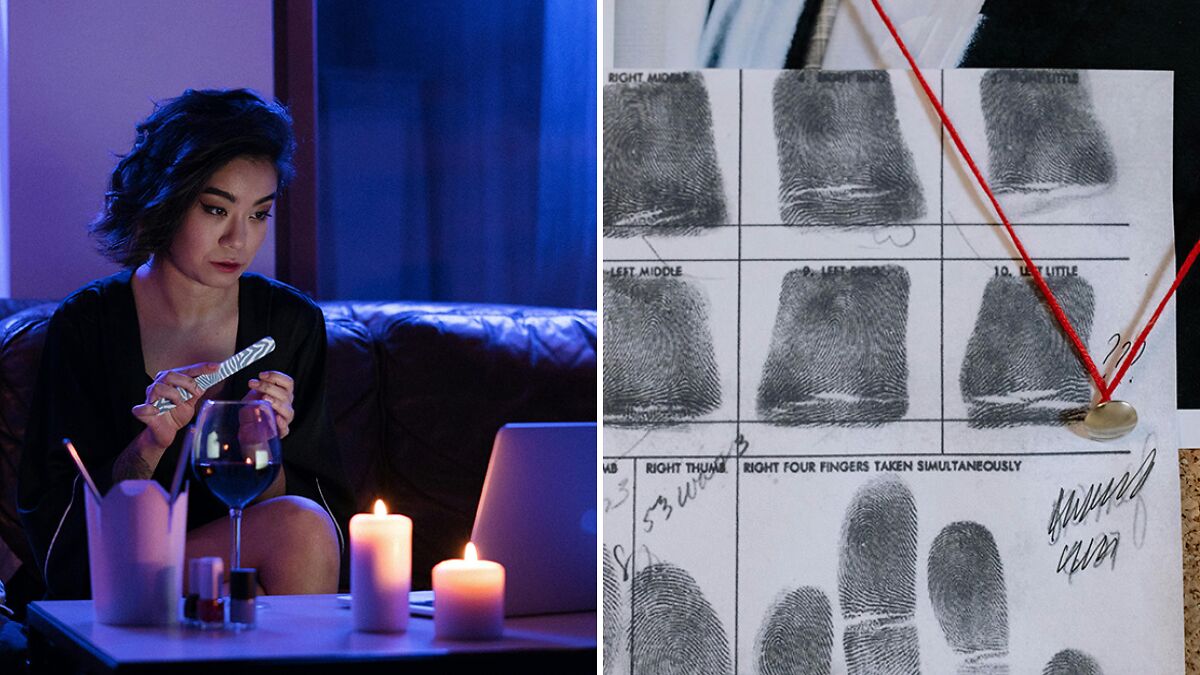
“How Can Humans Be So Awful?”: True Crime Mania Has Dark Consequences For Gen Z, Experts Reveal
Interview With ExpertStories of murders, kidnappings, and disappearances have become a cultural phenomenon, and while these real-life horror tales can be fascinating, experts say they may lead to an “overconfidence” that does not clash well with the world we live in.
Generation Z, in particular, who were born between the years 1997 and 2012, are most affected by the enthralling world of true crime. And with the influence of social media and TV shows such as Dahmer and The Menendez Brothers, it isn’t hard to see why.
- Gen Z's obsession with true crime may lead to overconfidence and desensitization.
- True crime offers Gen Z a sense of closure, unlike unpredictable real-world issues.
- Experts warn of a false sense of security from repeated exposure to violent stories.
In exclusive interviews with Bored Panda, various psychology and mental health experts shed some light on what aspects of true crime are the most attractive to Gen Z — and when these habits are detrimental to our health.
True crime is a prevalent topic for those in Generation Z, and while it can bring comfort and familiarity, there may be negative impacts of “going too far”
Image credits: cottonbro studio (Not an actual photo)
Being immersed in true crime can trigger a domino effect: once hooked, audience members tend to seek out more “sensational stories” — either to feel the thrill once more or to escape from reality for a few moments.
Whittier College’s psychology professor Christina Scott said concerns start when this “repeated exposure to violence” leads to a “desensitization to violent acts.”
This gradual numbness can also spark a different problem: overconfidence.
“Sometimes, there can be a sense of, ‘Well, I’m feeling really safe and confident in this world, so I want to take some of that with me,’” Christina said. “And it might be misplaced.”
Image credits: Matthew Finley
The mindset of “I can spot the killer; I would have done things differently; I would have done better,” can occur, which leads to a “false sense of security” in an already tumultuous and dangerous world.
According to experts, it’s completely possible for humans to miss the danger “right next to them” because they’re too focused on another threat.
But sometimes this misplaced sense of security is needed, just to go about one’s everyday life
Image credits: cottonbro studio (Not an actual photo)
A 23-year-old avid lover of true crime, who requested to go by ‘Jo,’ admitted to feeling the same at times.
“I won’t lie, I get that sense of security, and even though I know it’s insubstantial, having that sense of ‘I think I know how to avoid the world’s awfulness’ is necessary for simply existing,” she said. “You have to gaslight yourself into thinking you’re safe to convince yourself to walk outside or talk to other people.”
Image credits: Rotten Mango
Additionally, these indulgences may lead to an even darker path.
Bryan Kohberger — the primary suspect behind the infamous Idaho murders where four college students were brutally killed — was a criminology student and was well familiar with this field.
While an official motive has not been released, authorities suspect he was trying to “commit the perfect crime” or experience the adrenaline he so often read about in school, according to Newsweek.
Some lovers of true crime have described it as a kind of “drug” they can’t resist — and that statement may hold more truth than we think
Image credits: Bailey Sarian
Fiona Hannah, an expert at Teenage Mental Health, weighed in on why teenagers or those in their 20s are so attracted to the brutal realm of true crime, saying that it’s a natural instinct for human beings to be “drawn towards things that scare or excite us.”
She discussed the shaping of a development phase we go through during childhood called latency, which roughly happens between ages 6 and 11.
“During this phase, we tend to get interested in scary things, hence the success of Harry Potter and the Goosebumps series,” she said.
“Young people’s increased interests in true crime, I suspect, is merely an extension of this earlier interest in the latency phase and could be viewed as a way to return to this stage of development.”
Image credits: Getty / Unsplash
Indeed, it’s the promise of a thrilling experience that can draw young adults in.
“I click onto certain titles because I think ‘How the heck did this happen?’ or ‘Why would the killer do this?’” Jo explained. “And sure, part of it is probably that nugget of hope that says, ‘Maybe if I listen to what has happened to others, I can avoid it myself.’ But for me, I’m most fascinated by all the decisions and circumstances that led to such horrible things happening.”
“How can humans be so awful? How do we protect ourselves from each other?” the Gen Zer questioned
Image credits: Nik / Unsplash
While it might seem like a contradictory statement, the world of true crime can serve as an “escape” from the real world. With cases that have already been solved, it can provide young generations, such as Gen Z, with a sense of resolve.
“Many younger viewers may find themselves lacking control over the world around them — such as with politics, finances, climate change — and true crime series may provide predictable and dependable endings,” Christina explained.
“While Disney films always end in ‘happily ever after,’ true crime ends with a sense of closure and justice, even if it is much darker than a Disney film.”
Image credits: truecrime.memes
These cases, while sometimes brutal, can provide us with an opportunity to “shut out the rest of the world.”
“It’s a chance for us to just cocoon ourselves into something that we find engaging, and it brings us comfort in some form,” Christina added.
“It’s our safe spot, and it’s our spot where we feel more in control, and we feel entertained and engaged.”
But it seems as if a sense of closure is only one of the reasons why Gen Z is so fascinated with true crime
Image credits: truecrime.memes
These definitive endings have always captured the already short attention span of Gen Z — but data has shown that 56% of true crime viewers gravitate towards something much more open-ended: unsolved mysteries.
“There isn’t a specific genre I seek out, though I enjoy unsolved mysteries the most,” Jo admitted. “They make my brain run, and I also think the wild theories people come up with are sometimes more interesting than the mystery itself.”
Image credits: Getty / Unsplash
And perhaps it’s the creative freedom these stories offer that makes cold cases an eerie source of comfort.
“It’s unsolved — no one has the answer, so there’s no pressure,” Christina explained. “You can’t be wrong because your theory is just as valid as anybody else’s because the experts couldn’t figure it out.
“You can continue to process in the way that you want and tease apart other theories. And it’s not on your shoulders. You’re not the forensic person who has to solve it. You’re not the detective, you’re not part of the victim’s family. You can do it at a safe distance.”
Unsolved mysteries give audiences an opportunity to come up with an ending that fits into their version of justice
Image credits: cottonbro studio (Not an actual photo)
@the_mannii Based on a True Story #freecomedy♬ original sound – Matty Chymbor
Through it all, our mind is the one who gets to find the “satisfying ending” through the “safety net” of our screen.
More often than not, these endings are not for the faint of heart — but sometimes the “stability” they provide us is more than enough.
“[Gen Z] is left with this fear and this constant hum of anxiety and tension. So if you can put yourself in this world, where it can be fixed, it has to look really appealing,” Christina explained.
“It allows you to go in a world where things were chaotic and horrible, but you’re gonna find your way out.”
Some netizens gave their analysis on what true crime does to them or why it may fascinate others
Poll Question
Thanks! Check out the results:
Explore more of these tags
"Experts" have always been trying to stir up panic about true crime. Before it was podcasts, it was true crime on TV that was going to ruin people. Before that it was true crime books and magazines . Before that it was crime coverage in newspapers and pamphlets. People have always been interested in true crime, it's nothing new
Also that kids watching 'violent" cartoons eg Tom & Gerry would themselves become violent. Debunked years ago as will this half baked hypothesis.
Load More Replies...Uh-huh. Well, anyways... *turns true crime podcast back on*
Kids who grew up having to practice active shooter drills because these events have become so commonplace that we treat them the same way we do tornados or fires, but we're concerned about how a podcast will affect their mental health, while simultaneously not funding mental health services....okay.
Not a fan of podcasts but I love Forensic Files so much and can just put it on and doze peacefully to the dulcet tones of Peter Thomas talking about horrific murders.
I did not understand true crime until I was in my 30s. People are mostly good, so I'm curious about what makes people "bad". Turns out it's mostly money and greed. Anyway I don't consider myself "enjoying other people's suffering" like some people assume of me. It's not that deep so get down from your high horse.
I got way too into these in my early 20’s. But I had the opposite, I had to stop watching when I could no longer sleep at night and constantly felt like someone was going to break in and murder me every second of the day. It was terrible, almost ptsd-like. When I chose to stop watching all of that, after a few weeks, my life and anxiety levels were so much better.
I think most people who have been victims of personal crime (which is the only kind considered ‘true’) would baulk like I do at someone profiting from another’s distress, or providing further notoriety to someone who deserves to rot unforgotten somewhere. If true crime was just about solving burglaries or repeat shoplifters, I might be up for watching it! (Call me boring but I’ve had enough fear and distress in real life to last me the rest of my days.)
Everything old is new again and every generation thinks they're the first to discover something. Humans have always been fascinated by true crime stories. (Not this particular human, but many humans.)
"Experts" have always been trying to stir up panic about true crime. Before it was podcasts, it was true crime on TV that was going to ruin people. Before that it was true crime books and magazines . Before that it was crime coverage in newspapers and pamphlets. People have always been interested in true crime, it's nothing new
Also that kids watching 'violent" cartoons eg Tom & Gerry would themselves become violent. Debunked years ago as will this half baked hypothesis.
Load More Replies...Uh-huh. Well, anyways... *turns true crime podcast back on*
Kids who grew up having to practice active shooter drills because these events have become so commonplace that we treat them the same way we do tornados or fires, but we're concerned about how a podcast will affect their mental health, while simultaneously not funding mental health services....okay.
Not a fan of podcasts but I love Forensic Files so much and can just put it on and doze peacefully to the dulcet tones of Peter Thomas talking about horrific murders.
I did not understand true crime until I was in my 30s. People are mostly good, so I'm curious about what makes people "bad". Turns out it's mostly money and greed. Anyway I don't consider myself "enjoying other people's suffering" like some people assume of me. It's not that deep so get down from your high horse.
I got way too into these in my early 20’s. But I had the opposite, I had to stop watching when I could no longer sleep at night and constantly felt like someone was going to break in and murder me every second of the day. It was terrible, almost ptsd-like. When I chose to stop watching all of that, after a few weeks, my life and anxiety levels were so much better.
I think most people who have been victims of personal crime (which is the only kind considered ‘true’) would baulk like I do at someone profiting from another’s distress, or providing further notoriety to someone who deserves to rot unforgotten somewhere. If true crime was just about solving burglaries or repeat shoplifters, I might be up for watching it! (Call me boring but I’ve had enough fear and distress in real life to last me the rest of my days.)
Everything old is new again and every generation thinks they're the first to discover something. Humans have always been fascinated by true crime stories. (Not this particular human, but many humans.)

 Dark Mode
Dark Mode 

 No fees, cancel anytime
No fees, cancel anytime 






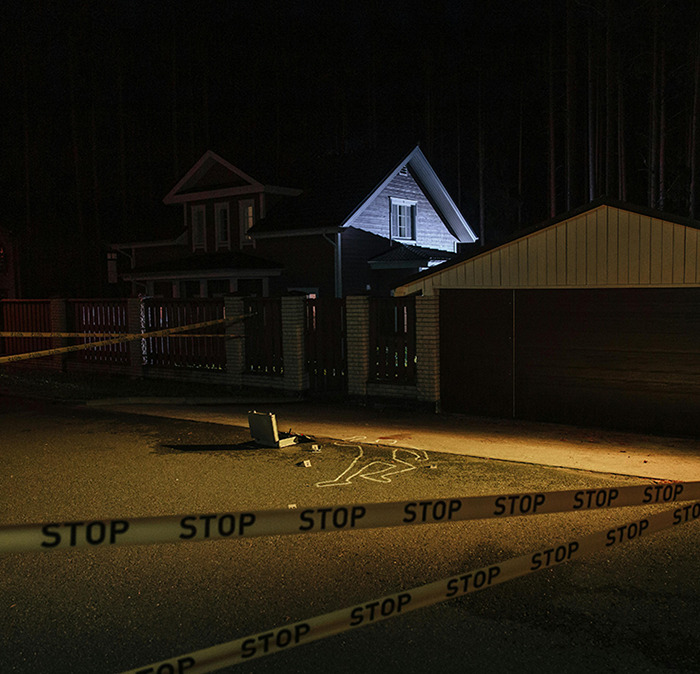


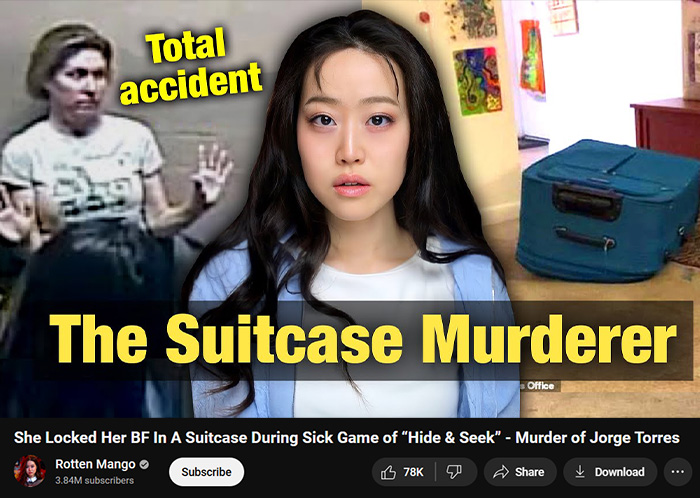
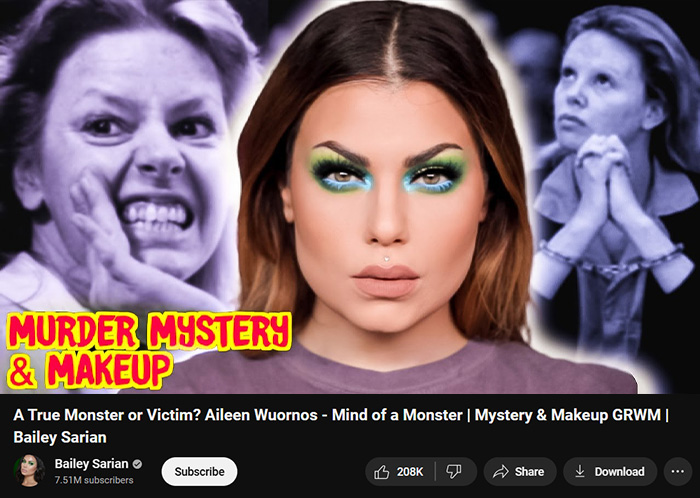


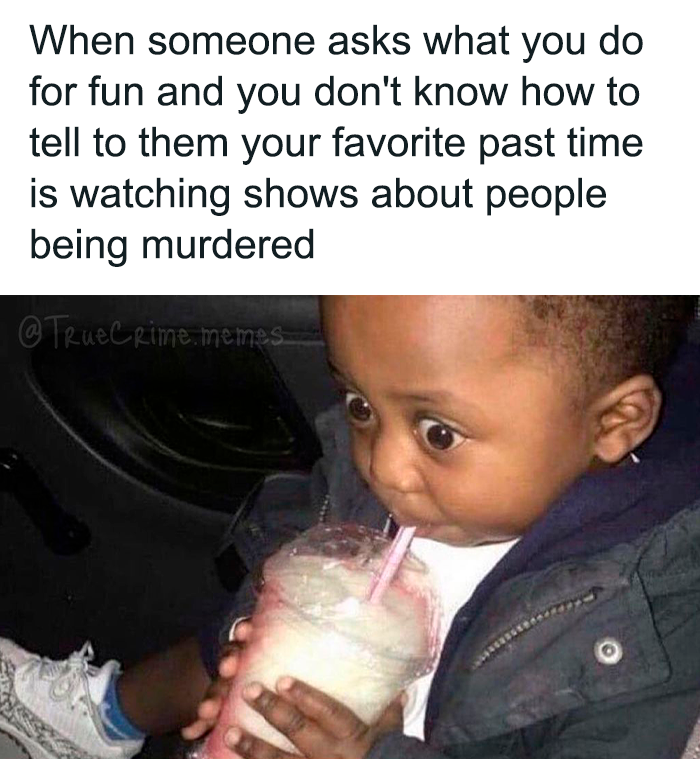
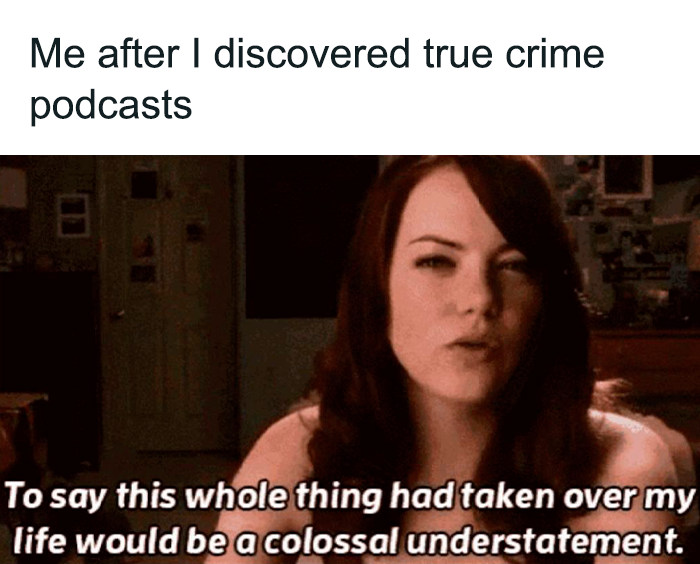

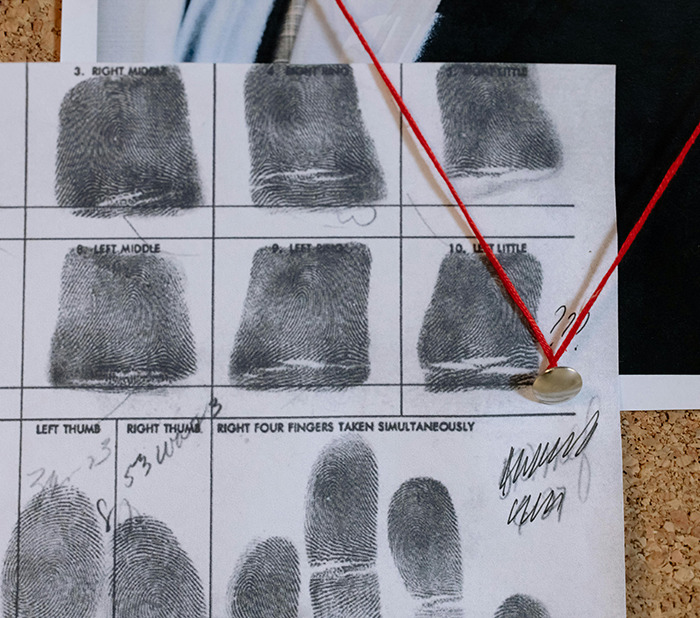
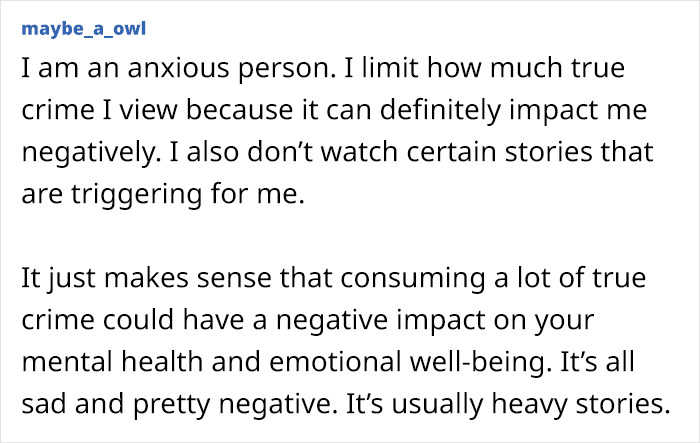
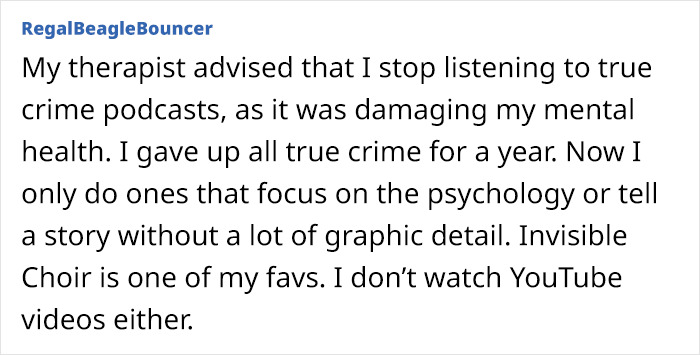
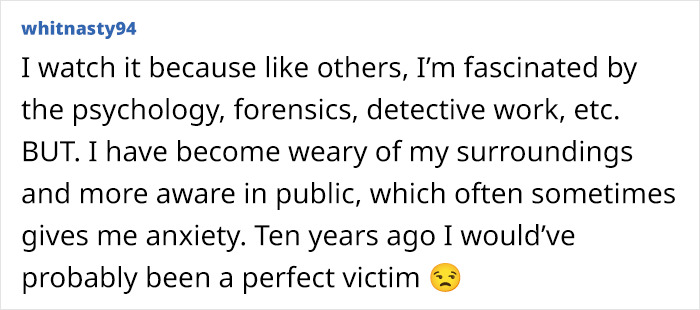
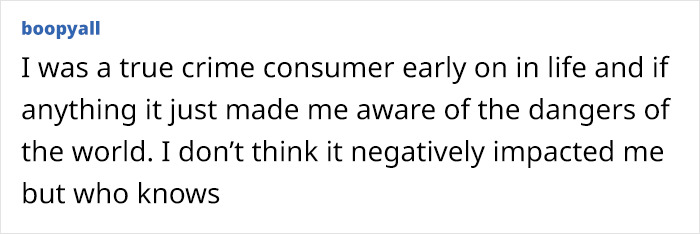
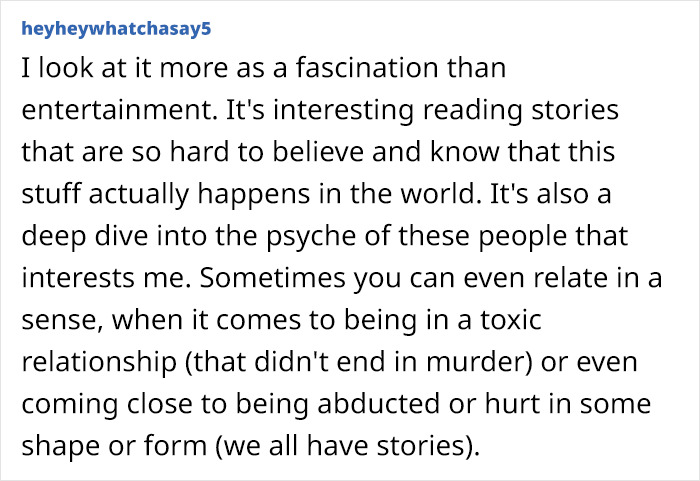
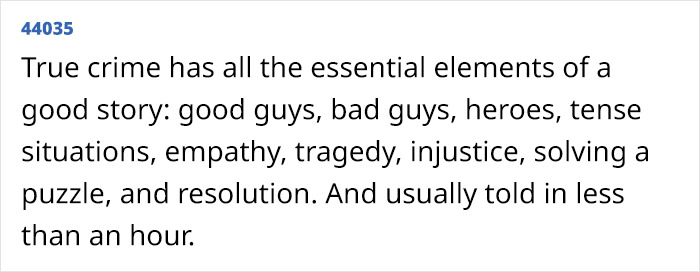
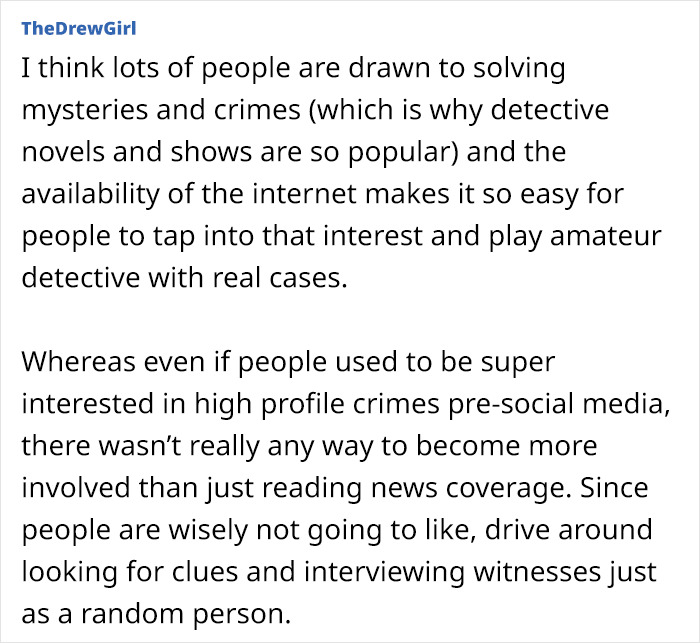

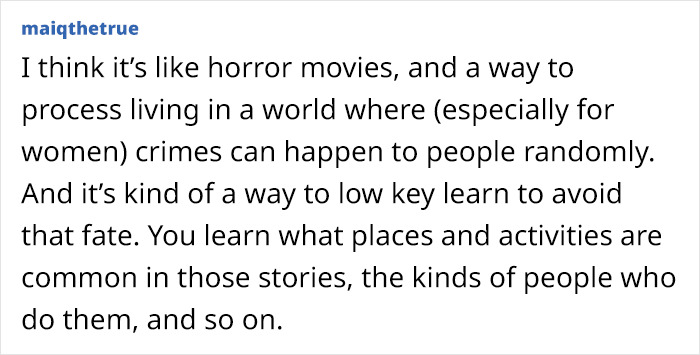










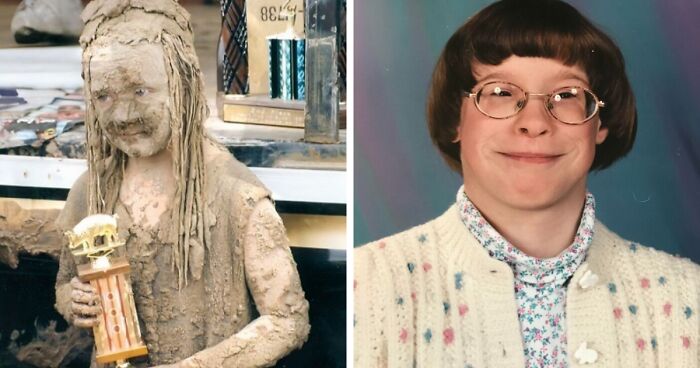





















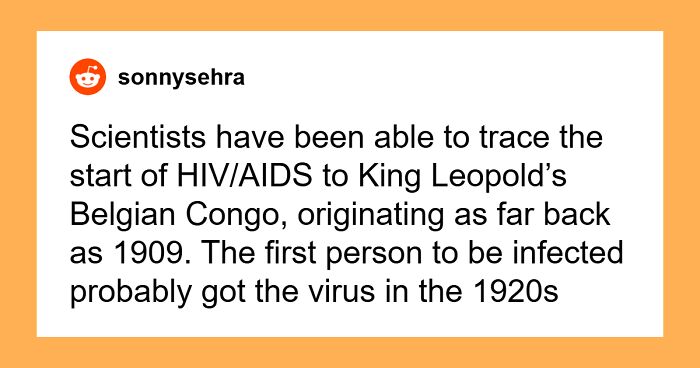











9
20